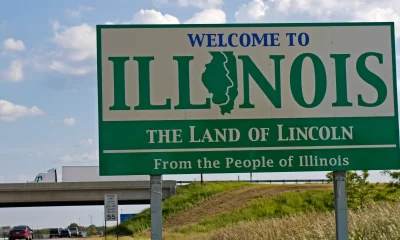Business
Wisconsin GOP Leaders Kill 500+ Proposals from Governor, Including Legal Cannabis

It was an eventful day in the Wisconsin legislature, to say the least.
Wisconsin Republicans killed more than 500 proposals from Gov. Tony Evers (D) on Tuesday, including a proposal to legalize cannabis, among others that would pay for Milwaukee Brewers’ stadium renovations, create a paid family leave program and more, AP News reports.
Evers called the move “foolish.” He had proposed using the state’s record-high $7 billion budget surplus to fund a number of state spending priorities, which Wisconsin Republican leaders ultimately rejected. Members voted 12-4 to eliminate Evers’s provisions in the budget request.
“With a historic $7 billion surplus, we have a historic responsibility and opportunity to invest in needs that have long been neglected and build the future we want for our state,” Evers said on Twitter, before listing a number of the 540 priorities that were rejected in a thread.
“These aren’t fringe ideas, controversial concepts, or Republican or Democratic priorities—they’re about doing the right thing. With a historic surplus comes historic responsibility, and today, when we can afford to do more, this vote is foolish and a wasted opportunity,” he added.
It’s not necessarily a shocking move, in regard to cannabis at least, since the Republican-controlled legislature has previously removed cannabis reform language from past budget proposals. Republican lawmakers in Wisconsin also previously warned that they would not allow an adult-use cannabis legalization proposal to progress.
The cannabis plan would have allowed adults over the age of 21 to purchase and possess up to two ounces of cannabis for personal use and grow up to six plants. The Department of Revenue would have been responsible for regulating the new cannabis market and issuing business licenses to prospective professionals in the cannabis space.
Evers’s office also estimated that the state would generate $44.4 million in “segregated tax revenue” from legal cannabis and a $10.2 million increase in state general fund tax revenue in fiscal year 2025, if the reform were to be enacted.
The governor is already known for his continuous pardons, mostly involving low-level offenses and including cannabis offenses. As of April 2023, Evers has hit 933 pardons in just over four years in office.
“It is one of the most rewarding parts of my job as governor to have the opportunity to grant a fresh start to folks who’ve made efforts to learn and grow from their past mistakes,” Evers said.
The onslaught of rejected proposals may be a case of déjà vu for Evers as well, as the governor also included recreational and medical cannabis legalization in his 2021 budget and decriminalization and medical cannabis in his 2019 proposal. The reforms were all blocked by the Republican legislature.
Last month, Assembly Speaker Robin Vos told the Associated Press that Republican lawmakers in the state were working to privately build support for a medical cannabis program aimed to gain bipartisan support, potentially to be enacted into law later this year. Vos also voiced that he is opposed to legalizing recreational cannabis and does not want to create a medical program to act as a precursor to the adult-use market.
However, it looks like Wisconsin voters are already setting their sights on broader horizons. An August 2022 Marquette Law School poll of 811 voters in the state showed bipartisan support for legal cannabis, with 51% of Republicans, 75% of independents and 81% of Democrats backing legalization. A total of 69% registered voters believed cannabis should be legal.
Additionally, continuing to stall on cannabis legalization is likely taking away potential state revenue. A report published earlier this year found that 50% of Wisconsinites 21 and older live within 75 minutes of an out-of-state cannabis retailer, likely to increase as Minnesota inches closer to legalization.
Business
New Mexico cannabis operator fined, loses license for alleged BioTrack fraud

New Mexico regulators fined a cannabis operator nearly $300,000 and revoked its license after the company allegedly created fake reports in the state’s traceability software.
The New Mexico Cannabis Control Division (CCD) accused marijuana manufacturer and retailer Golden Roots of 11 violations, according to Albuquerque Business First.
Golden Roots operates the The Cannabis Revolution Dispensary.
The majority of the violations are related to the Albuquerque company’s improper use of BioTrack, which has been New Mexico’s track-and-trace vendor since 2015.
The CCD alleges Golden Roots reported marijuana production only two months after it had received its vertically integrated license, according to Albuquerque Business First.
Because cannabis takes longer than two months to be cultivated, the CCD was suspicious of the report.
After inspecting the company’s premises, the CCD alleged Golden Roots reported cultivation, transportation and sales in BioTrack but wasn’t able to provide officers who inspected the site evidence that the operator was cultivating cannabis.
In April, the CCD revoked Golden Roots’ license and issued a $10,000 fine, according to the news outlet.
The company requested a hearing, which the regulator scheduled for Sept. 1.
At the hearing, the CCD testified that the company’s dried-cannabis weights in BioTrack were suspicious because they didn’t seem to accurately reflect how much weight marijuana loses as it dries.
Company employees also poorly accounted for why they were making adjustments in the system of up to 24 pounds of cannabis, making comments such as “bad” or “mistake” in the software, Albuquerque Business First reported.
Golden Roots was fined $298,972.05 – the amount regulators allege the company made selling products that weren’t properly accounted for in BioTrack.
The CCD has been cracking down on cannabis operators accused of selling products procured from out-of-state or not grown legally:
- Regulators alleged in August that Albuquerque dispensary Sawmill Sweet Leaf sold out-of-state products and didn’t have a license for extraction.
- Paradise Exotics Distro lost its license in July after regulators alleged the company sold products made in California.
Golden Roots was the first alleged rulebreaker in New Mexico to be asked to pay a large fine.
Source: https://mjbizdaily.com/new-mexico-cannabis-operator-fined-loses-license-for-alleged-biotrack-fraud/
Business
Marijuana companies suing US attorney general in federal prohibition challenge

Four marijuana companies, including a multistate operator, have filed a lawsuit against U.S. Attorney General Merrick Garland in which they allege the federal MJ prohibition under the Controlled Substances Act is no longer constitutional.
According to the complaint, filed Thursday in U.S. District Court in Massachusetts, retailer Canna Provisions, Treevit delivery service CEO Gyasi Sellers, cultivator Wiseacre Farm and MSO Verano Holdings Corp. are all harmed by “the federal government’s unconstitutional ban on cultivating, manufacturing, distributing, or possessing intrastate marijuana.”
Verano is headquartered in Chicago but has operations in Massachusetts; the other three operators are based in Massachusetts.
The lawsuit seeks a ruling that the “Controlled Substances Act is unconstitutional as applied to the intrastate cultivation, manufacture, possession, and distribution of marijuana pursuant to state law.”
The companies want the case to go before the U.S. Supreme Court.
They hired prominent law firm Boies Schiller Flexner to represent them.
The New York-based firm’s principal is David Boies, whose former clients include Microsoft, former presidential candidate Al Gore and Elizabeth Holmes’ disgraced startup Theranos.
Similar challenges to the federal Controlled Substances Act (CSA) have failed.
One such challenge led to a landmark Supreme Court decision in 2005.
In Gonzalez vs. Raich, the highest court in the United States ruled in a 6-3 decision that the commerce clause of the U.S. Constitution gave Congress the power to outlaw marijuana federally, even though state laws allow the cultivation and sale of cannabis.
In the 18 years since that ruling, 23 states and the District of Columbia have legalized adult-use marijuana and the federal government has allowed a multibillion-dollar cannabis industry to thrive.
Since both Congress and the U.S. Department of Justice, currently headed by Garland, have declined to intervene in state-licensed marijuana markets, the key facts that led to the Supreme Court’s 2005 ruling “no longer apply,” Boies said in a statement Thursday.
“The Supreme Court has since made clear that the federal government lacks the authority to regulate purely intrastate commerce,” Boies said.
“Moreover, the facts on which those precedents are based are no longer true.”
Verano President Darren Weiss said in a statement the company is “prepared to bring this case all the way to the Supreme Court in order to align federal law with how Congress has acted for years.”
While the Biden administration’s push to reschedule marijuana would help solve marijuana operators’ federal tax woes, neither rescheduling nor modest Congressional reforms such as the SAFER Banking Act “solve the fundamental issue,” Weiss added.
“The application of the CSA to lawful state-run cannabis business is an unconstitutional overreach on state sovereignty that has led to decades of harm, failed businesses, lost jobs, and unsafe working conditions.”
Business
Alabama to make another attempt Dec. 1 to award medical cannabis licenses

Alabama regulators are targeting Dec. 1 to award the first batch of medical cannabis business licenses after the agency’s first two attempts were scrapped because of scoring errors and litigation.
The first licenses will be awarded to individual cultivators, delivery providers, processors, dispensaries and state testing labs, according to the Alabama Medical Cannabis Commission (AMCC).
Then, on Dec. 12, the AMCC will award licenses for vertically integrated operations, a designation set primarily for multistate operators.
Licenses are expected to be handed out 28 days after they have been awarded, so MMJ production could begin in early January, according to the Alabama Daily News.
That means MMJ products could be available for patients around early March, an AMCC spokesperson told the media outlet.
Regulators initially awarded 21 business licenses in June, only to void them after applicants alleged inconsistencies with how the applications were scored.
Then, in August, the state awarded 24 different licenses – 19 went to June recipients – only to reverse themselves again and scratch those licenses after spurned applicants filed lawsuits.
A state judge dismissed a lawsuit filed by Chicago-based MSO Verano Holdings Corp., but another lawsuit is pending.
Source: https://mjbizdaily.com/alabama-plans-to-award-medical-cannabis-licenses-dec-1/
-

 Business2 years ago
Business2 years agoPot Odor Does Not Justify Probable Cause for Vehicle Searches, Minnesota Court Affirms
-

 Business2 years ago
Business2 years agoNew Mexico cannabis operator fined, loses license for alleged BioTrack fraud
-

 Business2 years ago
Business2 years agoAlabama to make another attempt Dec. 1 to award medical cannabis licenses
-

 Business2 years ago
Business2 years agoWashington State Pays Out $9.4 Million in Refunds Relating to Drug Convictions
-

 Business2 years ago
Business2 years agoMarijuana companies suing US attorney general in federal prohibition challenge
-

 Business2 years ago
Business2 years agoLegal Marijuana Handed A Nothing Burger From NY State
-

 Business2 years ago
Business2 years agoCan Cannabis Help Seasonal Depression
-

 Blogs2 years ago
Blogs2 years agoCannabis Art Is Flourishing On Etsy













